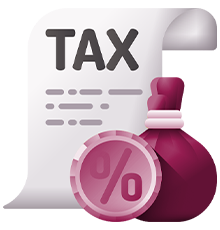Type of Customer
Type of Fixed Deposit
Date of Fixed Deposit
Amount Deposit in between 5K to
1.99Cr
5K
1.99Cr
Tenure
YY
MM
DD
We use cookies to improve your journey and to personalize your web experience. By continuing to use this site, you are accepting the bank’s cookie policy. I Accept
Banking is now at your fingertips with Axis Mobile! Give a missed call to 8422992272 to receive the download link for Axis Mobile via SMS
For Sole Props and Individuals with CA New

Explore 250+ banking services on Axis Mobile App open.
Scan to Download
Fixed Deposits (FDs) offer a secure and flexible way to grow your savings. With competitive interest rates and a minimum deposit of just ₹5,000, Axis Bank FDs are accessible to investors of all types. You can choose from a variety of deposit tenures ranging from 7 days to 10 years to match your financial goals.
Axis Bank’s digital banking platform makes it easy to open, manage and renew your FDs online. Additionally, you can benefit from an automatic roll-out facility that allows your FD interest to be reinvested or transferred to another account seamlessly.

FDs offer secure and predictable investment options with guaranteed returns.

FDs typically offer significantly higher interest rates compared to Savings Accounts, making them a more lucrative option to grow your savings.

Certain fixed deposits in India offer tax benefits under Section 80C, reducing your taxable income.

Opening an online Fixed Deposit is quick and easy, saving time and effort.

Maintaining an FD account can strengthen your relationship with your bank, leading to better deals and services.

Ideal for long and medium-term goals due to higher interest rates.

You can avail of loan against FDs, offering liquidity without breaking the deposit before the maturity period.

FD/RD accounts with specific modes of operation can be closed digitally. The Primary
Holder must initiate the request, and the Joint Holder must approve it on the same day
to close the deposit. This can be done via Internet
or Mobile Banking.
Read More
The Axis Bank FD calculator is a valuable resource for anyone considering a Fixed Deposit scheme. By adding details like the principal amount, interest rate and tenure, you can quickly calculate your estimated maturity value. This tool helps you compare online Fixed Deposit options, understand the impact of compounding and making informed decisions about your savings goals.
Check out our FD Calculator to easily estimate the returns on your fixed deposits.
(Indicative interest rates for calculation only. Click hereFor latest interest rates for latest rates.)
Renewing your fixed deposit in India is a simple process. Here is a step-by-step guide:
When selecting which FD to invest in, keep the following factors in mind:


Currently, the interest rate on a Fixed Deposit with Axis Bank ranges between 3.5% and 7.75%, depending on the tenure, deposit amount and customer type.
Interest earned on your FD is fixed for the chosen tenure and is calculated based on the interest rate applicable at the time of deposit.
Interest on Fixed Deposits can be credited to your account at different intervals, based on your chosen payout option – monthly, quarterly, or compounding at maturity. With cumulative FDs, interest is compounded quarterly and paid out at the end of the tenure, helping your investment grow faster. In contrast, non-cumulative FDs allow you to receive regular interest payouts to meet periodic income needs.
FD interest rates are reviewed periodically and may change depending on market conditions and bank policies, but once the deposit is made, your rate remains locked in for the entire term.
Interest earned on Fixed Deposits is taxable under the ‘Income from other sources’ category, with the tax rate determined by your income bracket. Most financial institutions deduct Tax Deducted at Source (TDS) at 10% if the annual interest from FDs exceeds ₹40,000 (₹50,000 for senior citizens).
If you do not provide your PAN, the TDS rate increases to 20%. You can claim a deduction for the TDS paid while filing your income tax return. While some tax-saving FDs offer tax benefits, interest on products like Certificate of Deposit is fully taxable.


An FD or Fixed Deposit is a type of investment where you deposit a lump sum amount with a bank for a fixed period of time. In return, you receive a predetermined interest rate on your investment. FDs are known for their safety and stability, making them a popular choice for those seeking a secure way to grow their savings.
The minimum deposit required to open an Axis Bank Fixed Deposit in India is ₹5000, allowing you to start investing in a Fixed Deposit with a relatively small amount.
Tax-saver FDs offer several distinct features. They provide income tax benefits under Section 80 C but have a mandatory lock-in period of 5 years. While interest earned is taxable, the interest rates remain fixed throughout the tenure.
To know more about Axis Bank’s Tax Saver Fixed Deposit, click here.
Yes, you can partially withdraw from Fixed Deposits. However, this typically comes with a penalty or reduced FD Rates. The exact charges vary depending on the bank, the amount withdrawn and the time remaining until maturity. It is advisable to check with the bank’s specific policies regarding premature withdrawals and partial withdrawals.
The minimum investment period for a Fixed Deposit typically ranges from 7 days to 10 years. However, specific terms may vary depending on the financial institution and the type of FD. For instance, tax-saving FDs often have a mandatory lock-in period of 5 years.
Yes, a Fixed Deposit (FD) can be made in the name of a minor. A parent or guardian can open the FD on behalf of the minor in question. The FD can be used for various purposes, such as saving for the minor’s education or future expenses. However, it is important to note that minors cannot withdraw funds from the FD until they reach the age of 18.
Yes, you can typically get an overdraft facility against your Fixed Deposit. This allows you to borrow funds against the value of your FD without breaking it. However, the eligibility criteria and the interest rates may vary depending on the type of FD.
Axis Bank offers Fixed Deposit tenures ranging from 7 days to 10 years, allowing you the flexibility to choose a term that aligns with your financial goals and risk appetite. Interest rates on Axis Bank Fixed Deposit Schemes vary based on the tenure and the type of FD chosen.
Yes, you can generally withdraw from your regular or online Fixed Deposit before maturity. However, you may be charged with a penalty for early withdrawal. Hence, it is essential to check the terms and conditions of your specific Fixed Deposit agreement to understand the exact penalties that may apply.